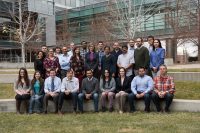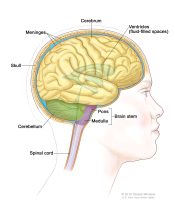MAF-funded researchers present at ISPNO 2024
The 21st International Symposium on Pediatric Neuro-Oncology was held June 28-July 2, 2024 in Philadelphia, Pennsylvania. ISPNO is the major global meeting for the international community of professionals involved in the scientific research, diagnosis, treatment, and rehabilitation of kids and teens with brain and central nervous system cancers. Doctors, researchers, and nurses you support from…
Two decades of advancements for kids with brain tumors
Over the past 20+ years, work done by clinicians and scientists in the Morgan Adams Foundation Pediatric Brain Tumor Research Program has driven important discoveries and revolutionary new approaches to treating kids with cancer. Here are some of the ways donor support has helped kids, teens, and young adults with brain tumors: Low-grade glioma Pediatric…
New treatment options for kids with treatment-resistant medulloblastoma
Medulloblastoma is a type of malignant brain tumor that is typically diagnosed in children and adolescents. It is one of the most common brain tumors seen in kids and accounts for 15-20% of all pediatric brain tumors. Medulloblastoma tumors usually form in the cerebellum. The cerebellum is the part of the brain that controls balance,…
Using genetic markers of disease to improve treatment and outcomes for kids and teens with cancer
Cancer is caused, generally, by genetic mutations starting in individual cells. A mutation changes how the body’s cells work, which can cause cells to multiply uncontrollably. Cancer typically requires multiple gene mutations. For the past several decades, scientists have been investigating the genetics of cancer and have identified many tumor-specific genetic markers. These tumor-specific markers…
2022 Highlights
Because of generous donor support, these eight clinical trials are helping kids with cancer right now: Newly diagnosed diffuse midline glioma Newly diagnosed or recurrent adamantinomatous craniopharyngioma Recurrent or progressive low- or high-grade glioma with BRAF mutation Relapsed posterior fossa ependymoma Infiltrative high- and low-grade glioma Recurrent ependymoma Group 3 and 4 medulloblastoma MYC-driven medulloblastoma…
Efforts to better classify and treat childhood cancers
As technology continues to advance and researchers learn more about how specific types of cancer form, grow, and respond to treatment, an increasing number of specific subtypes of cancer are being identified. The primary advancement in classifying all types of cancer currently comes from molecular profiling. Pediatric cancer is no exception and many new brain…
Improving Quality of Life for Kids and Teens with Cancer
A child who is diagnosed with cancer has their life turned upside down by appointments, treatments, pain, side effects, hospital stays, and innumerable missed milestones, school days, events, and activities. For kids with cancer, it is especially important to prioritize general well-being and their ability to enjoy daily life. Donor support of The Morgan Adams…
Finding effective treatment for teens and young adults with a deadly peripheral nervous system cancer
Neurofibromatosis Type 1 (NF1) is an inherited genetic disorder that leads to the formation of tumors on the peripheral nervous system, called plexiform neurofibromas. Plexiform neurofibromas are often benign, but they can transform into fatal malignant peripheral nerve sheath tumors (MPNST). Plexiform neurofibromas typically develop during childhood and early adulthood. They occur in various parts…
The search for effective treatment for kids with atypical teratoid rhabdoid tumor (ATRT)
Atypical teratoid/rhabdoid tumor (ATRT) is a rare and highly aggressive pediatric brain tumor. It typically affects kids 3 years and younger. The 5-year overall survival rate for kids with ATRT is about 30%. The standard treatment for ATRT is chemotherapy and radiation, which can improve outcomes, but leaves kids with significant long-term side effects. The…
Using Artificial Intelligence to Improve Diagnosis and Treatment for Kids with Cancer
What is artificial intelligence? Artificial intelligence (AI) is a technology that can simulate human intelligence characteristics including learning, predicting, analyzing, and deriving solutions using data. AI was first defined in 1956, but the use of the technology was limited through the early 2000s due to poor computer performance and other economic factors. In the 2010s,…










